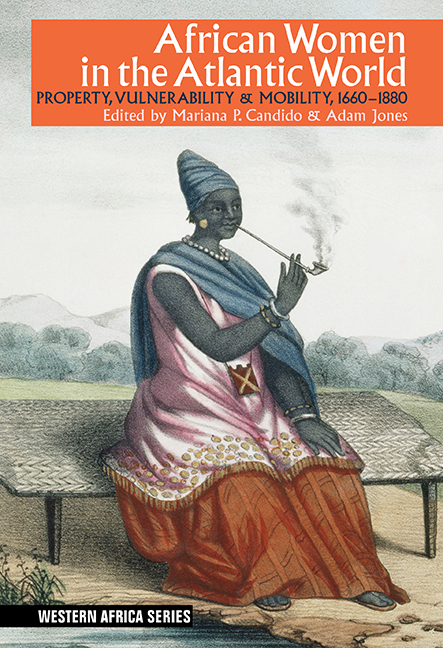Book contents
- Frontmatter
- Contents
- Acknowledgements
- List of Illustrations
- Contributors
- Map 1 Western Africa
- Introduction
- Part One Property
- 1 Adaptation in the Aftermath of Slavery Women, Trade & Property in Sierra Leone, c. 1790–1812
- 2 Women, Land & Power in the Lower Gambia River Region
- 3 Women & Food Production Agriculture, Demography & Access to Land in Late Eighteenth-Century Catumbela
- 4 Women's Material World in Nineteenth-Century Benguela
- Part Two Vulnerability
- Part Three Mobility
- Bibliography
- Index
4 - Women's Material World in Nineteenth-Century Benguela
from Part One - Property
Published online by Cambridge University Press: 26 March 2019
- Frontmatter
- Contents
- Acknowledgements
- List of Illustrations
- Contributors
- Map 1 Western Africa
- Introduction
- Part One Property
- 1 Adaptation in the Aftermath of Slavery Women, Trade & Property in Sierra Leone, c. 1790–1812
- 2 Women, Land & Power in the Lower Gambia River Region
- 3 Women & Food Production Agriculture, Demography & Access to Land in Late Eighteenth-Century Catumbela
- 4 Women's Material World in Nineteenth-Century Benguela
- Part Two Vulnerability
- Part Three Mobility
- Bibliography
- Index
Summary
This chapter examines consumption and trade, and women's central role as consumers of imported goods, including furniture, clothing, textiles and jewellery. In this study I will look at nineteenth-century wills and inventories available at the Tribunal da Província de Benguela in Angola to ascertain what kind of goods African women of Benguela acquired during their life time. Wills and post-mortem inventories list the material possessions women accumulated, helping us to determine how they lived. These sources allow us to imagine the interior of their homes and analyse their consumption habits and desires, providing information about private lives. Looking at the material world offers us the chance to place women at the centre of our analysis. Like Hilary Jones and Lorelle Semley, I stress how African women were connected to markets located as far away as Gujarat, Macau, Rio de Janeiro and Porto.
As Vanessa Oliveira and Esteban Salas show in this volume, African women were important economic actors in West Central Africa. Free or enslaved, they produced food, sold water and food in urban centres and assumed active roles in long-distance caravans. However, we know little about their consumption patterns and their integration into global markets. Long-distance trade was part of the experience of societies living close to the coast as well as in the interiors, which allowed people in the central highlands to consume alcohol and textiles from elsewhere in exchange for copper, salt, ivory or human beings. The contact with the Atlantic world created new markets, desires and objects of consumption. It also transformed local production, the landscape and market practices.
The trade goods listed in inventories offer a glimpse to what women collected in their houses. In some households the belongings were sparse, while other residents of Benguela lived at a level of comfort and luxury. These goods reveal connections within the Atlantic world and reinforce the idea that the engagement in the slave trade and, later, in legitimate commerce allowed Africans to become global consumers. Local societies produced wax, copper rings, ivory and animal skins, which were sold to European traders. They developed techniques to exploit these natural resources and transport them to markets where they were consumed. With the end of slave exports, cultivation of sugarcane and coffee increased, alongside the exports of natural resources such as ivory, wax, and rubber.
- Type
- Chapter
- Information
- African Women in the Atlantic WorldProperty, Vulnerability & Mobility, 1660–1880, pp. 70 - 86Publisher: Boydell & BrewerPrint publication year: 2019

